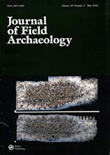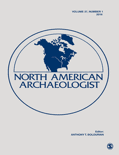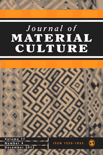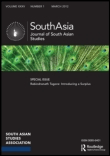
Ethnoarchaeology
Scope & Guideline
Bridging Cultures: Unraveling the Past Through Contemporary Practices
Introduction
Aims and Scopes
- Culinary Practices and Foodways:
Investigating traditional and contemporary food practices, the journal explores how food preparation, consumption, and cultural significance inform our understanding of past societies. This includes studies on brewing, cooking methods, and plant-based food sources. - Cultural Identity and Community Practices:
The journal examines how cultural identity is expressed through material culture and community practices, focusing on the roles of artisans, potters, and other craft producers in shaping social dynamics and identities. - Technological and Experimental Approaches:
Utilizing experimental archaeology and technological analysis, the journal assesses ancient manufacturing techniques and their implications for understanding past human behavior and cultural evolution. - Environmental and Subsistence Adaptations:
The journal highlights how different cultures adapt to their environments through subsistence strategies, including agricultural practices, water management, and resource utilization. - Indigenous Knowledge and Contemporary Relevance:
It emphasizes the importance of indigenous knowledge systems and practices in understanding historical contexts, as well as their relevance to contemporary issues such as conservation and sustainability.
Trending and Emerging
- Maritime and Coastal Studies:
An increasing focus on maritime cultures and coastal adaptations highlights the significance of water-based lifestyles and cosmologies, reflecting a growing recognition of the importance of maritime archaeology in understanding human history. - Food and Culinary Heritage:
Recent papers emphasize the exploration of culinary heritage and food memories, particularly in the context of diaspora and displacement, showcasing the cultural significance of food as a means of identity preservation. - Interdisciplinary Approaches:
There is a notable trend towards interdisciplinary research that combines ethnoarchaeology with other fields, such as anthropology, environmental science, and history, facilitating a more holistic understanding of past and present human behaviors. - Indigenous Knowledge and Conservation Practices:
The integration of indigenous knowledge systems into archaeological research is becoming increasingly prominent, underscoring the importance of these perspectives in contemporary conservation efforts and cultural heritage management. - Impact of Globalization on Local Practices:
The examination of how globalization affects local cultural practices and material culture is gaining traction, reflecting a broader interest in understanding the dynamics of cultural change in a globalized world.
Declining or Waning
- Experimental Replication Studies:
Although experimental archaeology remains a vital area, there has been a noticeable reduction in the number of papers focused solely on experimental replication of ancient techniques, suggesting a shift towards more integrative approaches that combine multiple methodologies. - Traditional Pottery Analysis:
The detailed analysis of traditional pottery and its production methods appears to be less frequent, possibly overshadowed by broader themes concerning foodways and community practices. - Historical Archaeology of Specific Regions:
Research focusing on the historical archaeology of specific regions, particularly less-studied areas, has diminished, indicating a potential decline in interest in localized studies in favor of broader comparative analyses.
Similar Journals

JOURNAL OF THE POLYNESIAN SOCIETY
Illuminating the Heritage of the IslandsJOURNAL OF THE POLYNESIAN SOCIETY, published by Polynesian Soc Inc, is a distinguished periodical that aims to disseminate high-quality research in the fields of anthropology, archaeology, and cultural studies. With an ISSN of 0032-4000 and E-ISSN 2230-5955, this journal serves as a key resource for scholars and practitioners interested in the rich historical and cultural narratives of the Polynesian region. Since its inception, the journal has published a multitude of scholarly articles, reflecting a convergence of research from 1971 to 2022, thus establishing itself as a foundational text within its domain. The journal is indexed in notable categories with a Q4 ranking in anthropology and a Q3 in both archaeology and cultural studies as of 2023, highlighting its relevant contributions to the academic community. Moreover, its impressive Scopus ranks position it within the 80th percentile for archaeology and the 67th percentile for anthropology, showcasing its dedication to scholarly excellence. Although not an open-access publication, the journal remains a vital avenue for academic discourse and exchange, making it a significant resource for researchers, professionals, and students dedicated to understanding the diverse cultures of the Pacific Islands.

Intersecciones en Antropologia
Advancing anthropological dialogue across borders.Intersecciones en Antropologia, published by the Universidad Nacional del Centro de la Provincia de Buenos Aires (UNICEN), Facultad de Ciencias Sociales, is a premier open-access journal in the field of anthropology, having established its presence since 2010. With an impressive impact factor and currently holding the distinguished Q1 quartile ranking in anthropology for 2023, this journal has quickly become a vital resource for scholars and practitioners alike, offering a platform for innovative research and critical discussion. The journal aims to advance anthropological scholarship by encouraging the dissemination of diverse perspectives and stimulating dialogue across geographical and cultural boundaries. Its open-access model, adopted in 2017, ensures that valuable research findings are accessible to a global audience, fostering collaboration and engagement within the academic community and beyond. Located in the vibrant cultural context of Argentina, Intersecciones en Antropologia serves as a conduit for significant anthropological dialogues, making it an essential read for those dedicated to understanding and contributing to the evolving landscape of social sciences.

JOURNAL OF FIELD ARCHAEOLOGY
Unearthing Knowledge, Shaping the Future of ArchaeologyJOURNAL OF FIELD ARCHAEOLOGY, published by Routledge Journals, Taylor & Francis Ltd, is a premier scholarly publication dedicated to advancing the field of archaeology. With an impressive impact factor reflecting its significant contributions to both the arts and humanities, this journal ranks in the Q1 category for archaeology, with a remarkable position of #21/413 in the arts and humanities realm and #19/354 in social sciences, placing it in the 95th percentile among its peers. Catering to researchers, professionals, and students alike, the journal has continuously explored critical archaeological questions since its inception in 1974, with a commitment to disseminating high-quality research and innovative methodologies up to the present. Although it operates under a traditional access model, the journal engages a broad readership with its insightful studies and findings, making it an essential resource for anyone deeply involved in archaeology and its related disciplines.

Prilozi Instituta za Arheologiju u Zagrebu
Unveiling the past through innovative research and insights.Prilozi Instituta za Arheologiju u Zagrebu is a prominent academic journal published by INST ARHEOLOGIJU, dedicated to advancing the field of archaeology and related historical studies. Operating in Croatia, this journal serves as a vital platform for scholars, researchers, and students to disseminate innovative research and insights within the realm of archaeology, with a focus on the rich cultural heritage of the region. The journal spans contributions from 2002 to 2011 and has ongoing publication since 2013, reflecting its commitment to contemporary archaeological discourse. With a growing reputation, it has achieved a Q3 ranking in the fields of Archaeology and Arts and Humanities, and a Q2 ranking in History, signifying its impact and relevance in the academic community. Although Open Access options are not available, the journal remains an essential resource for those pursuing in-depth knowledge and research in archaeology. Researchers can harness the journal's extensive scope to explore critical historical narratives and archaeological findings, solidifying its importance in both local and global contexts.

Origini
Bridging the Gap Between Past and Present Knowledge.Origini is a distinguished journal dedicated to the field of archaeology, published by EDIZIONI QUASAR S TOGNON SRL in Italy. With an ISSN of 0474-6805, it offers a platform for researchers and professionals to share their latest findings and insights. Having achieved a significant Q2 ranking in both Archaeology (Arts and Humanities) and Archaeology (Social Sciences) categories according to Scopus, it positions itself as a respected source of scholarly communication in the discipline. Over the converged years from 2017 to 2023, Origini has consistently aimed to advance archaeological research, fostering an environment where innovative theories and methodologies can be developed and discussed. Although it is not an Open Access journal, its contributions remain vital for academics and students seeking to deepen their understanding of archaeological practices and historical narratives. With a commitment to excellence, Origini stands as an essential resource within the archaeological community, inviting contributions that push the boundaries of knowledge and interpretation.

NORTH AMERICAN ARCHAEOLOGIST
Uncovering the Past, Shaping the FutureNORTH AMERICAN ARCHAEOLOGIST, published by SAGE PUBLICATIONS INC, is a prestigious journal that serves as an essential resource for professionals and scholars in the field of archaeology. With its ISSN 0197-6931 and E-ISSN 1541-3543, the journal aims to disseminate high-quality research that contributes to the understanding of the historical and cultural significance of North America from prehistory to the present. As of 2023, it holds an impressive Q2 category in Archaeology and ranks within the Q1 tier for Archaeology (arts and humanities), positioning it among the top journals in its field. Its Scopus rankings further emphasize its significance, reflecting a commendable percentile standing that underscores its influence in both arts and humanities and social sciences. The journal is committed to offering a platform for innovative research and scholarly discussion, making it invaluable for researchers, professionals, and students dedicated to advancing archaeological knowledge.

JOURNAL OF MATERIAL CULTURE
Unveiling the Stories Behind Objects and PracticesThe JOURNAL OF MATERIAL CULTURE, published by SAGE PUBLICATIONS LTD, stands at the forefront of interdisciplinary research in the realms of anthropology, archaeology, and arts and humanities. With an ISSN of 1359-1835 and an E-ISSN of 1460-3586, this esteemed journal has evolved since its inception in 1996, with its impactful contributions recognized by its Q2 ranking in the 2023 category quartiles across key fields. Positioned within the 82nd percentile for archaeology and 74th percentile for anthropology in Scopus, it serves as a vital resource for scholars, professionals, and students alike, keen to explore the complex interactions between material culture and social practices. While the journal adopts a traditional subscription model, its commitment to disseminating rigorous and innovative research ensures ongoing relevance and accessibility in a rapidly evolving academic landscape. The journal’s focus on fostering critical dialogues around materiality, identity, and meaning makes it indispensable for those committed to understanding the past and its implications for contemporary society in an increasingly material world.

Archaeology Ethnology and Anthropology of Eurasia
Bridging Disciplines to Uncover Eurasian NarrativesArchaeology Ethnology and Anthropology of Eurasia, published by PLEIADES PUBLISHING INC, is a leading academic journal that spans the fields of archaeology, ethnology, and anthropology, with a distinct focus on the Eurasian region. Since its inception in 2006, the journal has consistently aimed to foster interdisciplinary dialogue and innovative research, contributing significantly to our understanding of cultural interactions, historical dynamics, and social transformations in this diverse area. With a prestigious Q1 ranking in both Archaeology and Cultural Studies categories, it holds a strong position in the academic community, underscored by its Scopus rankings placing it in the top quartile of both fields. The journal is dedicated to promoting high-quality scholarly articles that advance knowledge and stimulate critical thinking among researchers, professionals, and students alike. Although it operates within a subscription model, the essence of its open dialogue and knowledge dissemination resonates through its accessible content. Join a vibrant community of scholars and delve into the intricate tapestry of Eurasian cultural heritage through this esteemed journal.

SOUTH ASIA-JOURNAL OF SOUTH ASIAN STUDIES
Exploring the Rich Tapestry of South Asian NarrativesSOUTH ASIA-JOURNAL OF SOUTH ASIAN STUDIES, published by Routledge Journals, Taylor & Francis Ltd, stands as a seminal platform for scholarly discourse in South Asian studies. With a proud history dating back to 1971, the journal provides a comprehensive examination of the region's multifaceted cultural, historical, and socio-political dynamics. Renowned for its rigorous peer-reviewed articles, it is listed in the prestigious Q1 category in Cultural Studies and History and has garnered respect across the social sciences, indicated by its competitive rankings in Development and Sociology and Political Science. Although it does not currently offer open access, the journal's influence is evident, boasting an impressive impact in its fields as indicated by its Scopus rankings, with a noteworthy 88th percentile in History. Targeted towards researchers, professionals, and students alike, SOUTH ASIA-JOURNAL OF SOUTH ASIAN STUDIES is essential for anyone seeking to deepen their understanding of South Asian complexities and contribute to ongoing academic conversations.

Stratum Plus
Navigating the Rich Tapestry of Human ExperienceStratum Plus, published by HIGH ANTHROPOLOGICAL SCH UNIV, is a distinguished academic journal based in Moldova that focuses on the fields of Anthropology, Archeology, and History. With an impressive impact factor reflecting its stature—ranked in the Q2 category for both Anthropology and Archeology, and Q1 for Archeology in the arts and humanities—this journal is a vital resource for scholars, professionals, and students alike. The journal's comprehensive scope encompasses a wide array of interdisciplinary studies, making it a beacon for innovative research and critical discourse within these disciplines. Since its inception in 2014, Stratum Plus has strived to foster academic excellence and knowledge dissemination, thus playing a crucial role in shaping contemporary anthropological and archaeological thought. While currently not available as Open Access, the journal maintains a strong online presence, with access options available through institutional subscriptions. Located at ZIMBRULUI 10A ST, KISHINEV MD-2024, MOLDOVA, Stratum Plus invites contributors and readers to engage with cutting-edge research that continues to enrich the global academic community.